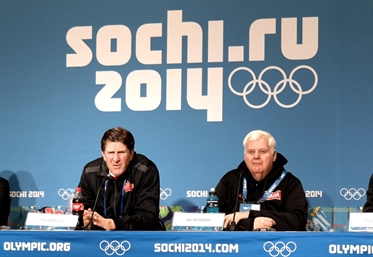Canada's quest begins
Canada's quest begins
Champs aim to end 62-year overseas drought

 Mike Babcock and Ken Hitchcock address the media at a press conference after Team Canada's first practice. Photo: Martin Merk
Mike Babcock and Ken Hitchcock address the media at a press conference after Team Canada's first practice. Photo: Martin Merk
On the plus side, head coach Mike Babcock enjoys a 25-man Olympic roster deeper in talent than any other nation, except, arguably, at the goaltending position.
The Detroit bench boss, who became the only coach in the IIHF’s Triple Gold Club (Olympic gold, World Championship gold, and Stanley Cup) in 2010, put his troops through a crisp evening practice, complete with a shootout drill, and experimented with different lines at the Bolshoy Ice Dome.
“Our preparation has to be equal to the opportunity, and the opportunity’s great,” said Babcock.
Could Sidney Crosby wind up centering Pittsburgh teammate Chris Kunitz and Jeff Carter of the Los Angeles Kings? Will Chicago’s Jonathan Toews and Patrick Sharp be teamed with Rick Nash? How about Patrick Marleau of San Jose working with California rivals Ryan Getzlaf and Corey Perry of the Anaheim Ducks?
Those were some early test drives, but things could easily change between now and Canada’s opener versus Norway on Thursday.
“I think we’ve made it clear so far that a bunch of guys are going to have to play different roles than they normally play with their team,” said Toews, who scored for Canada in the 2010 Olympic gold medal game and was named Best Forward of the tournament. “I think we have a lot of versatile guys with skill who can play defensively as well.”
“On your teams back home, you’re going to play 17 or 22 minutes a game,” added Corey Perry, who had Canada’s other regulation-time goal versus the U.S. in the final. “But here, you could play 6, 7, 8 or 10, whatever.”
Canada comes into this tournament basically healthy – with the notable exception of former 60-goal man Steven Stamkos of the Tampa Bay Lightning, whose broken right leg will keep him out. Still, 38-year-old Martin St. Louis, the 2013 NHL scoring champion, is a worthy replacement.
Steve Yzerman is St. Louis’s general manager in Tampa Bay as well as with Team Canada, and there was some controversy about the diminutive superstar not being selected initially.
“I don’t think he’ll play with a chip on his shoulder,” Yzerman said. “I think he’s a very proud guy and wants to win a gold medal. He wants to be in the Olympics and he’ll play hard.”
Canada’s abundance of healthy talent contrasts with the plethora of injured stars that have dropped out for fellow medal contenders Sweden (Henrik Sedin, Johan Franzen), Slovakia (Marian Gaborik, Lubomir Visnovsky), and Finland (Mikko Koivu, Valtteri Filppula).
And when a Canadian all-star squad lands in Russia, it evokes inspirational memories of the 1972 Summit Series. In that historic confrontation, Paul Henderson scored in the final minute of Game Eight in Moscow to give the NHL’s top Canadians a narrow victory over the Soviet national team.
This year marks the first time Canada’s sent its very best to Russia since ‘72.
Canadian teams have also achieved great victories on Russian ice at the 1988 World Juniors and 2007 World Championship in Moscow. Current Olympic team members Toews, Nash, Shea Weber, and Dan Hamhuis all played on that victorious latter squad.
Now, on the minus side, Canada has fared poorly in IIHF men’s competition since Crosby scored the “golden goal” at 7:40 of overtime on February 28, 2010.
Out of the “Big Seven” hockey powers – also including the Czech Republic, Finland, Russia, Slovakia, Sweden, and the United States – only Canada has failed to advance beyond the quarter-finals at each of the last four World Championships.
It’s not as if Canada was represented by third-rate players at those tournaments in Germany (2010), Slovakia (2011), and Sweden and Finland (2012, 2013). While in general there could have been better representation from veteran players, 14 of the Canadians here in Sochi have suited up in at least one World Championship in the last four years.
It’s given Canada a level of respect even for their so-called “lesser” opponents.
“Every game’s a tough game,” said 23-year-old first-time Olympian John Tavares of the New York Islanders. “I remember World Championships for me in Slovakia. We beat Norway 3-2. It was a very close, tight game. They’re a team that competes hard, and they have a tremendous skill set. They made a lot of plays that game. Obviously, some of these countries that may not be as well-known have played together for a long time. That makes a big difference, and all those teams are going to be ready to play.”
Tavares, a three-time World Championship participant, added that the time he spent playing in Switzerland during the last NHL lockout was “very useful.”
Every player worth his salt will discount the usefulness of history, but it remains a fact that Canada has not won Olympic gold outside North America since 1952.
That year, Canada was represented by the Edmonton Mercurys, a senior amateur team, mostly composed of employees of the car dealership that sponsored them. They outscored their opposition 71-14, and only conceded one point in the 3-3 tie with the U.S. that gave them gold. Times have indeed changed.
There have been mitigating factors for this lack of overseas success, though. Canada did not start sending a true national team to the Olympics until 1964, and that team did not include professionals. It boycotted the 1972 and 1976 Winter Games due to a dispute about amateur eligibility rules. Also, it did not take advantage of the open door for full NHL participation that was available as early as the 1988, 1992, and 1994 Olympics.
Is it time for the motherland of hockey to lay to rest the ghosts of Nagano 1998 (fourth) and Turin 2006 (seventh)? Certainly, this squad should be much better-prepared for the perils of the shootout, which proved to be Canada’s undoing against a god-like Dominik Hasek in ‘98, and will bring better team speed than the ‘06 group, which never adapted well to the big-ice game.
“I think we’ve heard a lot of people talk about ‘can’t win on big ice and can’t do this and can’t do that,’and we’re looking at it as a challenge,” said assistant coach Ken Hitchcock. “We think we’ve got a heck of a hockey club. We know there are other teams that are good too, but I think quite frankly, we feel like we’ve got a gear that we can play at that’s substantial.”
Talk about heavy pressure has abounded for months.
“Everybody wants to add so much more pressure,” said Getzlaf, another 2010 veteran. “Players, we show up at the rink and we do our job. We get ready to play. I’ve played for Team Canada for 10 or 15 years now at different levels, and every tournament we go to, we want to win. We expect gold. That pressure’s with us all the time.”
Right now, the players, who normally stay in first-class hotels, are simply adjusting to dormitory life in the Olympic village. Crosby will room with Weber, for example, while goalie Roberto Luongo, entering his third Olympics, will get his own digs.
The coaches are busy fine-tuning their game plan. Babcock has an impressive collection of NHL assistants in Hitchcock, Claude Julien, and Lindy Ruff. Hitchcock quipped that Babcock runs a “benevolent dictatorship.”
“Babs is a guy who’s pretty intense, pretty serious,” said Luongo. “In a tournament like this, that’s what you’re looking for. You’ve got to get down to business right away.”
Babcock also has an important consultant on his staff. Ralph Krueger, the former coach of the Swiss national team (1998-2010), should ease Canada’s overseas transition. The 54-year-old Winnipeg product, who coached Edmonton last year, was specifically assigned to scout Norway and Austria, as he knows the European game so well.
There will be time to make adjustments and improve, but not too much. After all, the first men’s teams will be eliminated on Tuesday, February 18.
“When we play our first game, we’ve got to think that we’re playing the U.S. or Russia every single game,” said Toews. “That’s the level we need to play at to get to the right level when the games really matter in this tournament.”
It’s a great challenge, and Canada, at least on paper, has the tools to become the first back-to-back Olympic champion since the Soviet Union turned the trick in 1984 and 1988.
Back to Overview











































